o-captain-my-captain文体学分析报告
- 格式:ppt
- 大小:2.02 MB
- 文档页数:16
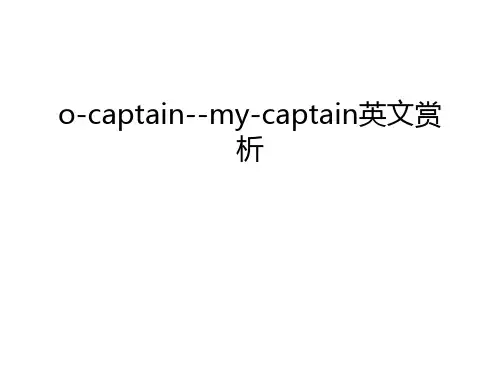
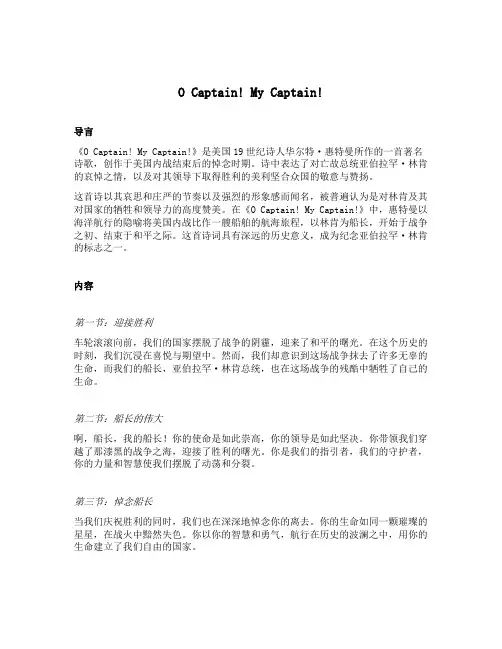
O Captain! My Captain!导言《O Captain! My Captain!》是美国19世纪诗人华尔特·惠特曼所作的一首著名诗歌,创作于美国内战结束后的悼念时期。
诗中表达了对亡故总统亚伯拉罕·林肯的哀悼之情,以及对其领导下取得胜利的美利坚合众国的敬意与赞扬。
这首诗以其哀思和庄严的节奏以及强烈的形象感而闻名,被普遍认为是对林肯及其对国家的牺牲和领导力的高度赞美。
在《O Captain! My Captain!》中,惠特曼以海洋航行的隐喻将美国内战比作一艘船舶的航海旅程,以林肯为船长,开始于战争之初、结束于和平之际。
这首诗词具有深远的历史意义,成为纪念亚伯拉罕·林肯的标志之一。
内容第一节:迎接胜利车轮滚滚向前,我们的国家摆脱了战争的阴霾,迎来了和平的曙光。
在这个历史的时刻,我们沉浸在喜悦与期望中。
然而,我们却意识到这场战争抹去了许多无辜的生命,而我们的船长,亚伯拉罕·林肯总统,也在这场战争的残酷中牺牲了自己的生命。
第二节:船长的伟大啊,船长,我的船长!你的使命是如此崇高,你的领导是如此坚决。
你带领我们穿越了那漆黑的战争之海,迎接了胜利的曙光。
你是我们的指引者,我们的守护者,你的力量和智慧使我们摆脱了动荡和分裂。
第三节:悼念船长当我们庆祝胜利的同时,我们也在深深地悼念你的离去。
你的生命如同一颗璀璨的星星,在战火中黯然失色。
你以你的智慧和勇气,航行在历史的波澜之中,用你的生命建立了我们自由的国家。
第四节:团结与希望面对船长的离去,我们感到了无尽的悲痛。
然而,我们要记住他的精神和奉献,将其传承下去。
船长的领导力和智慧将永远激励着我们,使我们意识到自由和团结的重要性。
第五节:追寻船长的足迹如今,我们继承了船长留给我们的国家。
我们肩负着责任,为了船长的梦想和愿景努力奋斗。
我们要继续前行,追寻船长的足迹,为国家的繁荣和和平不断努力。
结束语《O Captain! My Captain!》是一首充满敬意和悼念的诗歌,表达了对于林肯总统和他所领导的美国的赞美。
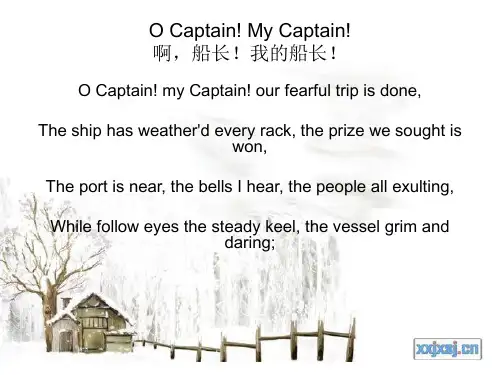
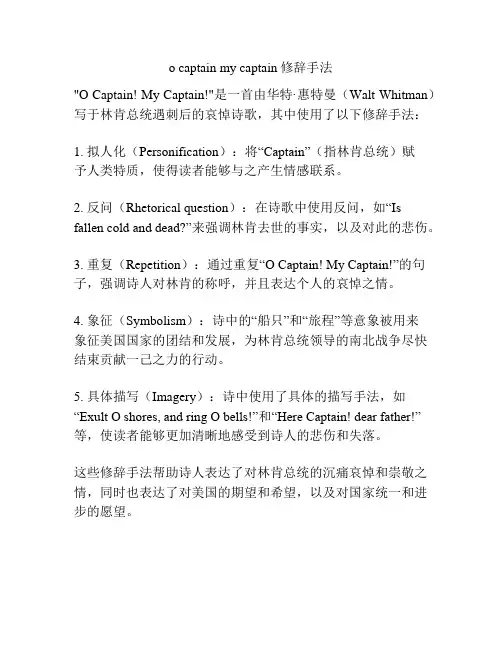
o captain my captain修辞手法
"O Captain! My Captain!"是一首由华特·惠特曼(Walt Whitman)写于林肯总统遇刺后的哀悼诗歌,其中使用了以下修辞手法:
1. 拟人化(Personification):将“Captain”(指林肯总统)赋
予人类特质,使得读者能够与之产生情感联系。
2. 反问(Rhetorical question):在诗歌中使用反问,如“Is fallen cold and dead?”来强调林肯去世的事实,以及对此的悲伤。
3. 重复(Repetition):通过重复“O Captain! My Captain!”的句子,强调诗人对林肯的称呼,并且表达个人的哀悼之情。
4. 象征(Symbolism):诗中的“船只”和“旅程”等意象被用来
象征美国国家的团结和发展,为林肯总统领导的南北战争尽快结束贡献一己之力的行动。
5. 具体描写(Imagery):诗中使用了具体的描写手法,如“Exult O shores, and ring O bells!”和“Here Captain! dear father!”等,使读者能够更加清晰地感受到诗人的悲伤和失落。
这些修辞手法帮助诗人表达了对林肯总统的沉痛哀悼和崇敬之情,同时也表达了对美国的期望和希望,以及对国家统一和进步的愿望。
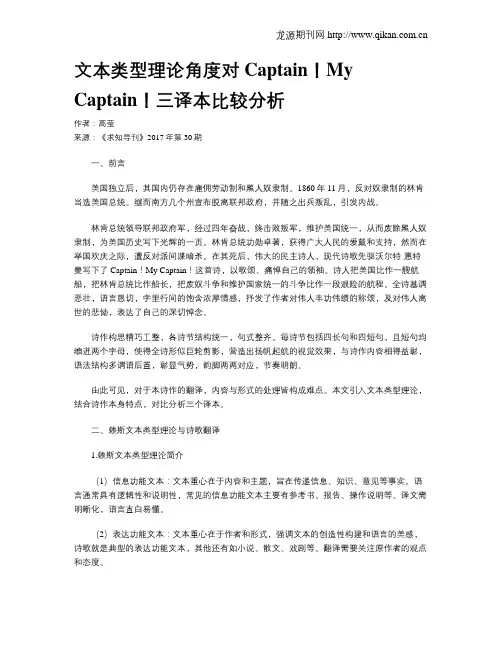
文本类型理论角度对Captain!My Captain!三译本比较分析作者:高莹来源:《求知导刊》2017年第30期一、前言美国独立后,其国内仍存在雇佣劳动制和黑人奴隶制。
1860年11月,反对奴隶制的林肯当选美国总统。
继而南方几个州宣布脱离联邦政府,并随之出兵叛乱,引发内战。
林肯总统领导联邦政府军,经过四年奋战,终击败叛军,维护美国统一,从而废除黑人奴隶制,为美国历史写下光辉的一页。
林肯总统功勋卓著,获得广大人民的爱戴和支持,然而在举国欢庆之际,遭反对派间谍暗杀。
在其死后,伟大的民主诗人,现代诗歌先驱沃尔特·惠特曼写下了Captain!My Captain!这首诗,以歌颂、痛悼自己的领袖。
诗人把美国比作一艘航船,把林肯总统比作船长,把废奴斗争和维护国家统一的斗争比作一段艰险的航程。
全诗基调悲壮,语言恳切,字里行间的饱含浓厚情感,抒发了作者对伟人丰功伟绩的称颂,及对伟人离世的悲恸,表达了自己的深切悼念。
诗作构思精巧工整,各诗节结构统一,句式整齐。
每诗节包括四长句和四短句,且短句均缩进两个字母,使得全诗形似巨轮剪影,营造出扬帆起航的视觉效果,与诗作内容相得益彰,语法结构多谓语后置,彰显气势,韵脚两两对应,节奏明朗。
由此可见,对于本诗作的翻译,内容与形式的处理皆构成难点。
本文引入文本类型理论,结合诗作本身特点,对比分析三个译本。
二、赖斯文本类型理论与诗歌翻译1.赖斯文本类型理论简介(1)信息功能文本:文本重心在于内容和主题,旨在传递信息、知识、意见等事实。
语言通常具有逻辑性和说明性,常见的信息功能文本主要有参考书、报告、操作说明等。
译文需明晰化,语言直白易懂。
(2)表达功能文本:文本重心在于作者和形式,强调文本的创造性构建和语言的美感,诗歌就是典型的表达功能文本,其他还有如小说、散文、戏剧等。
翻译需要关注原作者的观点和态度。
(3)操作功能文本:文本的重心在于感召,旨在通过说服、呼吁、劝阻文本读者或接受者采取某种行动,其语言特点是对话式的,常见的文本主要有广告、竞选演说等。
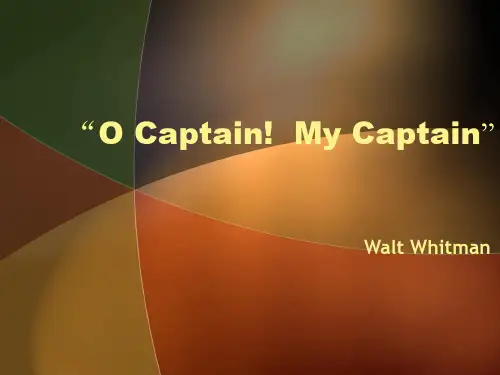
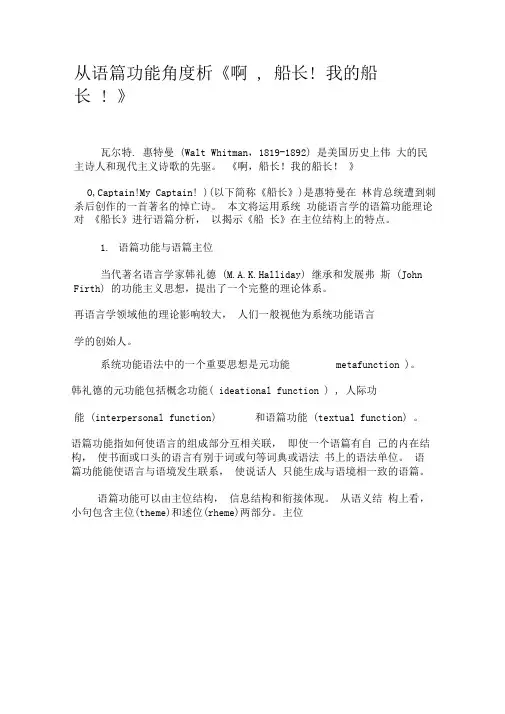
从语篇功能角度析《啊 , 船长! 我的船长 ! 》瓦尔特. 惠特曼 (Walt Whitman ,1819-1892) 是美国历史上伟 大的民主诗人和现代主义诗歌的先驱。
《啊,船长!我的船长! 》O,Captain!My Captain! )(以下简称《船长》)是惠特曼在 林肯总统遭到刺杀后创作的一首著名的悼亡诗。
本文将运用系统 功能语言学的语篇功能理论对 《船长》进行语篇分析, 以揭示《船 长》在主位结构上的特点。
1. 语篇功能与语篇主位当代著名语言学家韩礼德 (M.A.K.Halliday) 继承和发展弗 斯 (John Firth) 的功能主义思想,提出了一个完整的理论体系。
再语言学领域他的理论影响较大, 人们一般视他为系统功能语言 学的创始人。
韩礼德的元功能包括概念功能( ideational function ) , 人际功 和语篇功能 (textual function) 。
语篇功能指如何使语言的组成部分互相关联, 即使一个语篇有自 己的内在结构, 使书面或口头的语言有别于词或句等词典或语法 书上的语法单位。
语篇功能能使语言与语境发生联系, 使说话人 只能生成与语境相一致的语篇。
语篇功能可以由主位结构, 信息结构和衔接体现。
从语义结 构上看,小句包含主位(theme)和述位(rheme)两部分。
主位系统功能语法中的一个重要思想是元功能metafunction )。
能 (interpersonal function)是话语交际的出发点,是小句发展的基础;述位是对主位的说明,是信息内容最重要的部分。
句子的第一个成分是主位,其余部分属于述位。
主位和述位一起组成一个信息结构( thematic structure )。
主位总是位于小句的句首,但句首位置不是定义主位的方法,而是实现主位功能的手段。
韩礼德根据主位本身的复杂程度,把主位分为“单项主位”simple theme ), “复项主位” (multiple theme) 和“句项主位” (clause theme)。

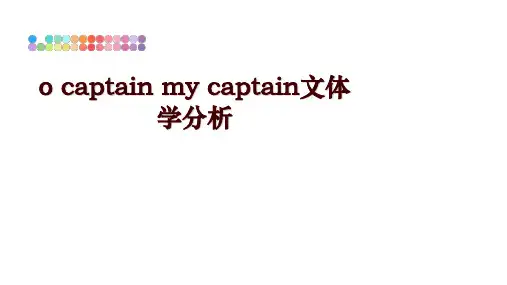
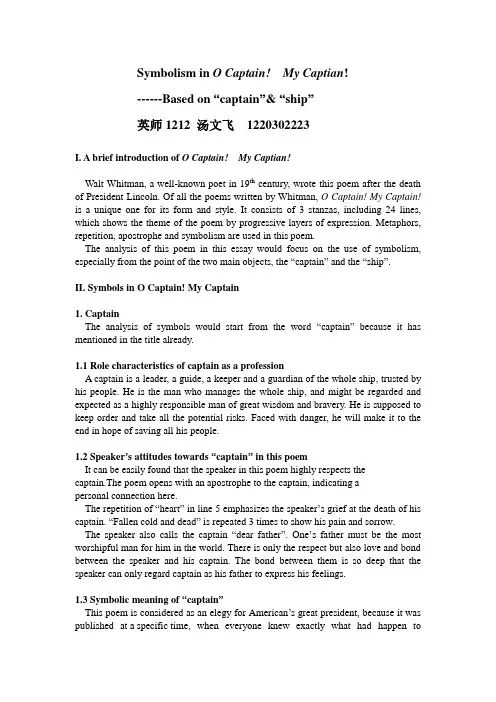
Symbolism in O Captain! My Captian!------Based on “captain”& “ship”英师1212 汤文飞1220302223I. A brief introduction of O Captain! My Captian!Walt Whitman, a well-known poet in 19th century, wrote this poem after the death of President Lincoln. Of all the poems written by Whitman, O Captain! My Captain! is a unique one for its form and style. It consists of 3 stanzas, including 24 lines, which shows the theme of the poem by progressive layers of expression. Metaphors, repetition, apostrophe and symbolism are used in this poem.The analysis of this poem in this essay would focus on the use of symbolism, especially from the point of the two main objects, the “captain” and the “ship”.II. Symbols in O Captain! My Captain1. CaptainThe analysis of symbols would start from the word “captain”because it has mentioned in the title already.1.1 Role characteristics of captain as a professionA captain is a leader, a guide, a keeper and a guardian of the whole ship, trusted by his people. He is the man who manages the whole ship, and might be regarded and expected as a highly responsible man of great wisdom and bravery. He is supposed to keep order and take all the potential risks. Faced with danger, he will make it to the end in hope of saving all his people.1.2 Speaker’s attitudes towards “captain” in this poemIt can be easily found that the speaker in this poem highly respects thecaptain.The poem opens with an apostrophe to the captain, indicating apersonal connection here.The repetition of “heart” in line 5 emphasizes the speaker’s grief at the death of his captain. “Fallen cold and dead” is repeated 3 times to show his pain and sorrow.The speaker also calls the captain “dear father”. One’s father must be the most worshipful man for him in the world. There is only the respect but also love and bond between the speaker and his captain. The bond between them is so deep that the speaker can only regard captain as his father to express his feelings.1.3 Symbolic meaning of “captain”This poem is considered as an elegy for American’s great president, because it was published at a specific time, when everyone knew exactly what had happen toLincoln.The description of captain is solemn. The great captain “lies on the deck”, “cold and dead”, while his people are exulting because of their triumph. He is “bleeding red drops”, with his “arms beneath his head”. He died, on his devoted post, before his people. He brought his people brightness, with himself left in endless darkness.The captain lies on the deck while others are celebrating. The place he died weighs a lot. It’s not like the captain died in his bedroom or jumped into the sea like Rose and Jack. He died at his post, as Lincoln was gunned down while he was still the president. This is tragic.1.4 Background information & Whitman’s emotional expressionAbraham Lincoln, the “captain” to whom Whitman refers, was a man Whitman deeply admired And Lincoln did not disappoint his admirer and gained stature as Lincoln’s presidency progressed and as the North won the Civil War, preserving the union. Lincoln was a respected captain, especially a dedicated leader who guided the “ship” in a right way. It was Lincoln’s death that affected Whitman the most and trapped him in the grief. The poet’s only wish at the time might be that Lincoln could wake up, standing and looking at his people.It would be the most heartbroken thing in the world to see one’s hero die. But, to describe the death of one’s hero might be more painful and bitter. In honor of his great hero, the poet decided to write something to express his grief and tribute. However, recalling and imagining word be a second harm to Whitman. Although I don’t know how he wrote this poem, I’m sure that it was a great suffering to write the death of his hero.2. Ship2.1 Symbolic meaning of “ship”The word “ship” appears first in line 2, “the ship has weather’d every rack, the prize we sought is won”. Considering the symbolic meaning of “captain”, we can assume that “ship”, which is controlled or managed by the “captain” , symbolizes the country --United States. The word “ship” appears 3 times, along with other expressions like “keel” and “deck”, which have the hided meaning as ship. And the “steady keel”indicates that the ship, like United States, remains steadfast despite its rough voyage.2.2 Connections between “ship” and United StatesA ship is doomed to face all the potential dangers. It must fight in a lone battle because no one can help in the dangerous sea. The only way for people to make it isto unite as one. The ship stands for the nation as it moved through the difficult times of Civil War, which refers to “our fearful trip” in the first line.A nation is like a ship because it is fragile and changing. Both of them need a man to take responsible. Lincoln had the responsibility of guiding the country safely through those known and unknown dangers or risks.A ship is the home of people on it while United States is the home of its people. Both of them provide people with a shelter, and are ready to protect them from those dangers.The ship came home safely as the nation won its war. Despite the past hardships, both the ship and United States are still afloat.2.3 Other symbolic itemsThere also other symbols that express the theme of this poem. Most of them are the used to emphasize the two main symbols, the “captain” and the “ship”. For instance, the “prize” is the preservation of the union. It is a prize won by the captain “Lincoln”after struggling with the “storm”. It is a prize won in a hard way and it is the best praise and honor for the captain. Descriptions like “flag is flung”, “bugle trills” cast a shadow over the celebration of victory on the deck, which show a tragic contrast in the same place.The poet’s grief is accentuated by the contrasting celebrations of victory and lamentations of captain’s death. There was a small population who were happy to see the victory, with the dead captain left on the deck. Among the crowded, only the speaker was mourning. It indicates that the captain lied alone while others were celebrating. The contrast shows the poet’s deep grief to the captain in a more sorrowful way.“Exult, O shores” is mentioned in line 20. The “shore” here is used as a symbol to represent the crowd that greets the ship. And the crowds are meant to represent all the people in United States.III. Conclusion & Self understandingIn my opinion, poets are those who have the most sensitive mind among common people, and a poem is a magnifying glass of the reflection upon a society. From this poem, I can not only feel the poet’s grief upon his hero, but also admiration, respect, patriotism etc. He represents the miniature of United States after the Civil War in a poem with 24 lines. He wrote a little, but we feel so much. That is the nature of a poem.。
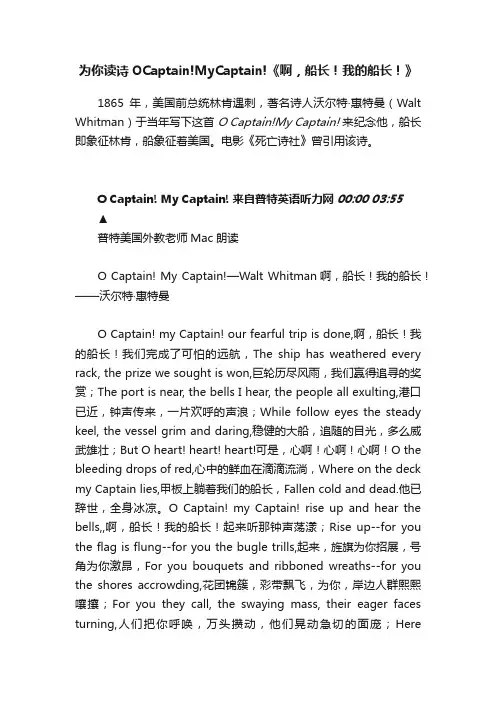
为你读诗OCaptain!MyCaptain!《啊,船长!我的船长!》1865年,美国前总统林肯遇刺,著名诗人沃尔特·惠特曼(Walt Whitman)于当年写下这首O Captain!My Captain! 来纪念他,船长即象征林肯,船象征着美国。
电影《死亡诗社》曾引用该诗。
O Captain! My Captain! 来自普特英语听力网00:0003:55▲普特美国外教老师Mac朗读O Captain! My Captain!—Walt Whitman啊,船长!我的船长!——沃尔特·惠特曼O Captain! my Captain! our fearful trip is done,啊,船长!我的船长!我们完成了可怕的远航,The ship has weathered every rack, the prize we sought is won,巨轮历尽风雨,我们赢得追寻的奖赏;The port is near, the bells I hear, the people all exulting,港口已近,钟声传来,一片欢呼的声浪;While follow eyes the steady keel, the vessel grim and daring,稳健的大船,追随的目光,多么威武雄壮;But O heart! heart! heart!可是,心啊!心啊!心啊!O the bleeding drops of red,心中的鲜血在滴滴流淌,Where on the deck my Captain lies,甲板上躺着我们的船长,Fallen cold and dead.他已辞世,全身冰凉。
O Captain! my Captain! rise up and hear the bells,,啊,船长!我的船长!起来听那钟声荡漾;Rise up--for you the flag is flung--for you the bugle trills,起来,旌旗为你招展,号角为你激昂,For you bouquets and ribboned wreaths--for you the shores accrowding,花团锦簇,彩带飘飞,为你,岸边人群熙熙嚷攘;For you they call, the swaying mass, their eager faces turning,人们把你呼唤,万头攒动,他们晃动急切的面庞;HereCaptain! dear father!在这里,船长,慈爱的父亲!This arm beneath your head!你的头下枕着我的臂膀!It is some dream that on the deck,那是甲板上的梦境,You've fallen cold and dead.你已辞世,全身冰凉。
Oh,Captain,My captain陈寅恪先生曾在内外交困的环境中这样标举:自由之思想,独立之人格;匈牙利诗人裴多菲曾经高声歌唱:生命诚可贵,爱情价更高。
若为自由故,二者皆可抛;美国诗人惠特曼也曾真情流露:啊,船长,我的船长。
许多日子以后,我再次听见这样的声音,是托德站在课桌上,面对即将离去的基廷老师,带领全班大声呼喊:Oh,Captain,My captain!我向来欣羡思想自由,人格独立。
但我也并不反对影片中威尔顿预科学院传统教育模式对于学生的严格管控与要求。
正如哲学家所说:存在即合理。
更何况,传统教育模式在时间的长河中一再延续,其中培养出不乏伟大而卓越的人物。
但正处于此种教育模式中的我们何以对基廷老师心向神往,对影片中我们真实生活的折射深恶痛绝,答案或许有一个:我们正在被接受的,远非我们的本心。
我总认为,呆板的束缚,在一切艺术的面前都是相形见绌的。
我并不是否认文学等艺术的规律性,而是不赞同我们以规律为手段去试图约束艺术,尤其是诗歌。
基廷老师的第一课,就让学生们撕去了利用坐标体系评去价诗歌水平的导言。
我很佩服基廷老师的勇气,也很欣赏基廷老师向学生教授诗歌的方式,他很努力的创设着一种诗意的情境,于不自觉中,学生与作者达到某种情感共鸣,诗歌的韵味和汹涌的情感便脱口而出。
正是这样一种灵动的教学方式,在威尔顿预科学院却需要极大的勇气。
我觉得这种勇气之于本身就毕业于预科学院的基廷老师,正如顾城《一代人》所写的那样:黑夜给了我黑色的眼睛,我却用它寻找光明。
尽管我们知道,这丝丝缕缕的光明何以点亮整个漆黑的夜空,但只为拥有光明的希望而去探求的脚步,这本身,就足以令人感动。
死亡诗社的成立,正是同学们受自由光芒的指引而向寂静、压抑的夜空发出的呼喊。
我敬佩社员向黑夜进发的热情,为自由集会的精神,向诗歌致敬的理想。
这让我想起王小波的杂文《沉默的大多数》,而这“大多数”如今仍然生活在我们的周围,他们在四面铜墙铁壁的屋子里小心翼翼,不敢高声语,唯恐自己成为被枪子击中的出头鸟或者先腐烂的出头椽子。
o captain my captain修辞手法"O Captain! My Captain!" is a famous poem written by Walt Whitman as an elegy for President Abraham Lincoln.The poem employs multiple rhetorical devices, including:1. Apostrophe: The poet addresses the late President Lincoln using the title "O Captain! My Captain!" This figure of speech conveys deep admiration and emotional attachment.2. Repetition: The phrase "O Captain! My Captain!" is repeated throughout the poem, emphasizing the poet's grief and urgency in mourning the loss of his beloved leader.3. Anaphora: The repetition of the word "fallen" in the lines "But O heart! heart! heart!/O the bleeding drops of red..." creates a sense of rhythm and amplifies the impact of Lincoln's death.4. Symbolism: The term "Captain" represents President Lincoln and symbolizes his leadership, guidance, and courage during a time of national crisis.5. Synecdoche: The image of Lincoln lying "cold and dead" represents the larger loss of the President as a whole, emphasizing the magnitude of the nation's grief.6. Hyperbole: The poet describes the ship's "fearful trip" and the dangers faced, exaggerating the risks taken on the journey as a parallel to the challenges faced by Lincoln during his presidency.7. Metaphor: The line "The ship is anchor'd safe and sound, its voyage closed and done," uses the ship as a metaphor for the United States, symbolizing the end of the Civil War and the nation's path to recovery.Overall, the poem employs various rhetorical devices to expressthe poet's sorrow, tribute, and admiration for President Lincoln, emphasizing the impact of his leadership and the nation's loss.。
o captain my captain读后感在我阅读《O Captain! My Captain!》这首诗的过程中,我深深地被其丰富的情感和深邃的主题所打动。
作为一篇表达了深深的不满和对自由的渴望的诗,它让我重新审视了我自己的生活和价值观。
首先,我被诗中的主题深深吸引。
诗人通过描绘一位悲惨的船长,表达了他对压迫和不公正的深深不满。
这位船长是社会不公的象征,而诗人则是希望变革的反抗者。
这首诗使我意识到,我们必须勇敢地面对生活中的不公,敢于发出自己的声音,敢于追求自由和正义。
其次,我被诗中的情感表达所打动。
诗人通过丰富的意象和生动的比喻,将他的情感表达得淋漓尽致。
在读到“我看见草长出来,长在死者们的坟墓上”这一句时,我深深地感受到了诗人内心的痛苦和哀怨。
这种情感表达的力度,使我深受触动,也让我更加深入地理解了诗人的内心世界。
再次,这首诗引发了我对自由和正义的思考。
在诗中,诗人通过描绘船长的悲惨命运,表达了他对自由的渴望和对正义的追求。
这使我意识到,我们必须勇敢地追求自由和正义,不能被社会的压迫和不公所束缚。
只有当我们敢于发出自己的声音,敢于挑战不公,才能真正实现我们的自由和正义。
最后,这首诗也让我反思了自己的社会责任。
作为社会的一员,我们每个人都有责任为社会做出贡献,同时也应该勇于承担自己的社会责任。
在面对社会问题时,我们应该勇敢地站出来,发出自己的声音,为社会的进步和发展贡献自己的力量。
总的来说,《O Captain! My Captain!》这首诗给我留下了深刻的印象。
它不仅表达了诗人对自由和正义的追求,也让我重新审视了自己的生活和价值观。
我相信,只有我们勇敢地面对生活中的不公,敢于追求自由和正义,才能真正实现我们的梦想和价值。
在未来的日子里,我将继续关注社会问题,勇于发出自己的声音,为社会的进步和发展贡献自己的力量。
我也将更加珍视自己的自由和权利,勇于维护自己的尊严和价值。
我相信,只有当我们每个人都能够勇敢地面对自己的内心世界,才能真正实现我们的梦想和价值。